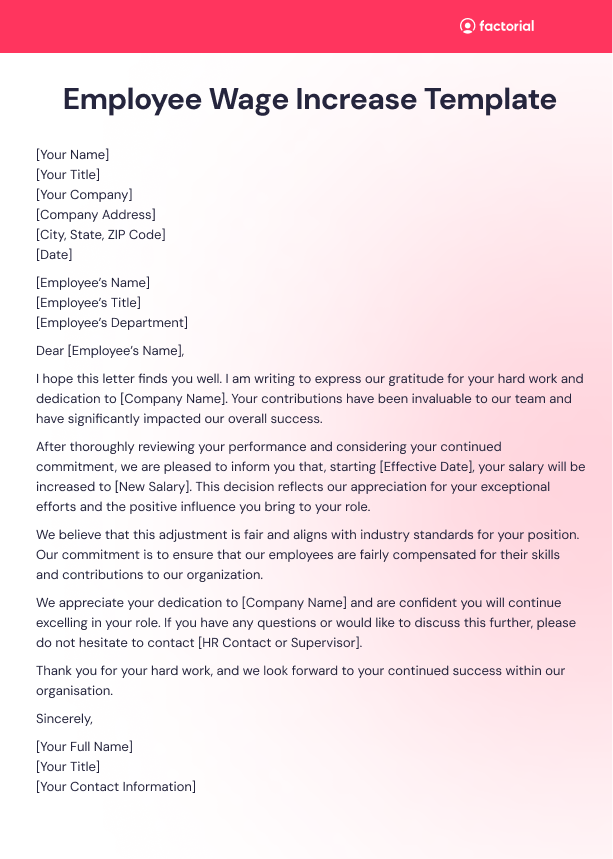An employee wage increase letter is what companies use to inform team members of a rise in compensation. A salary increase letter should outline an employee’s previous salary, their new salary, and the overall change in annual salary. But that’s not all.
Here, we outline exactly what employers should include in a pay increase letter and provide a sample letter for an increase in salary to help you get started.
What is an Employee Wage Increase Letter?
An employee wage increase letter is a formal document that employers use to communicate to staff that their salary or wages will be increased. It usually follows a standard format, outlining:
- The details of the salary adjustment, including the new salary amount
- The effective date of the increase
- Any additional information related to the change
If you’re looking to personalise your salary increase letter slightly, you can express appreciation for the employee’s contributions to the company and explain the reasons behind the wage increase. Customising it in this way is a nice way to show genuine gratitude and is likely to go down well with your team members.
What are the Benefits of a Pay Rise Letter?
A pay rise letter can offer several benefits for both the employer and the employee. Here are four key advantages:
- Motivation and job satisfaction: A salary increase often boosts an employee’s morale and motivation. It can serve as recognition for their hard work and dedication, fostering a positive work environment and boosting productivity.
- Talent retention: Salary increase letters can be an effective strategy to retain valuable employees. When employees feel fairly compensated, they are less likely to seek opportunities elsewhere!
- Enhances performance: Employees may be more motivated to excel in their roles because their efforts are recognised and rewarded. In fact, LSE Professor Erika Deserranno studied the relationship between wages and productivity and found that “raising minimum wage is a cost for businesses, but it works well as long as outside employment options aren’t great and if there’s good monitoring of workers within the firm…Productivity goes up and departures go down.”
- Positive workplace relationships: Providing a pay rise through a formal letter fosters open communication between the employer and the employee. Clearly outlining the reasons for the increase and expressing appreciation can strengthen the relationship and build trust – which is crucial for maintaining a healthy, working relationship!
How to Write a Salary Increase Letter
In 2025, wages and salaries in the UK grew 3.9%, which highlights the importance of proactively adjusting pay within your team. Salary increases are happening nationwide, meaning line managers should be prepared to communicate them effectively.
There are a few key elements to consider when creating a salary increase letter. They are as follows:
- Header: Include your company’s letterhead, which typically contains the company name, logo, address, and contact information. Also, include the date of the letter.
- Salutation: Address the employee by their proper title and name. Use a formal salutation, such as “Dear [Employee’s Name],”.
- Opening paragraph: Begin with a positive and appreciative tone. Express gratitude for the employee’s contributions and dedication to the company and clearly state the letter’s purpose, i.e. that the employee is receiving a salary increase.
- Main body: Specify the current salary and the new salary after the increase. Provide the effective date of the salary increase. Briefly explain the reasons for the salary adjustment. This could include factors like outstanding performance, increased responsibilities, market adjustments, or other relevant considerations.
- Additional Details: Mention any additional benefits or changes accompanying the salary increase, if any. This won’t always be applicable! This is also your chance to address any conditions or expectations associated with the salary adjustment.
- Closing Paragraph: Reiterate appreciation for the employee’s contributions. Encourage open communication if the employee has any questions or concerns. Try to end your letter on an optimistic note!
- Closing: Use a formal closing, such as “Sincerely” or “Best Regards.” and include your name, title, and contact information.
It’s then up to you how you deliver the letter.
Writing a Salary Letter Increase – Do’s
When writing a pay raise letter to your employees, it’s important to include specific information and be as transparent as possible.
- Recognition: ensure you are making your team feel valued for their hard work and express appreciation for their work. Take the time to highlight their achievements and call out their positive attitude, resilience, or overperforming qualities.
- Be straightforward: when giving your employee a pay raise, ensure you are clear and concise with the new payment terms. This also applies to employee requests where you aren’t able to meet their expected salary. It’s important to be transparent and inform your team of all factors and aspects that were considered when deciding on a salary.
- Schedule a meeting: give your team members the opportunity to express their thoughts or concerns. This ensures your team feels heard and supported.
Writing a Salary Letter Increase – Don’ts
There are certain things you should avoid when writing salary increase letters.
- Don’t be vague or generic: ensure your pay raise letters are personalised to each employee. That way, you can add a personal touch to the process, and it acts as a way to recognise your team for their hard work.
- Don’t make promises: don’t promise salaries that are outside of your budget. Ensure you’ve done the calculations and offer a salary increase that is sustainable long-term and within your company’s limitations.
- Don’t ignore legal requirements: make sure you run your salary increase letter template by your legal team so you maintain compliance with local and national laws.
Sample Letter for Salary Increase
You can copy and paste the pay increase template letter (UK) template below and use it to inform your team member of their salary increase.
[Your Name]
[Your Title]
[Your Company]
[Company Address]
[City, State, ZIP Code]
[Date]
[Employee’s Name]
[Employee’s Title]
[Employee’s Department]
Dear [Employee’s Name],
I hope this letter finds you well. I am writing to express our gratitude for your hard work and dedication to [Company Name]. Your contributions have been invaluable to our team and have significantly impacted our overall success.
After thoroughly reviewing your performance and considering your continued commitment, we are pleased to inform you that, starting [Effective Date], your salary will be increased to [New Salary]. This decision reflects our appreciation for your exceptional efforts and the positive influence you bring to your role.
We believe that this adjustment is fair and aligns with industry standards for your position. Our commitment is to ensure that our employees are fairly compensated for their skills and contributions to our organization.
We appreciate your dedication to [Company Name] and are confident you will continue excelling in your role. If you have any questions or would like to discuss this further, please do not hesitate to contact [HR Contact or Supervisor].
Thank you for your hard work, and we look forward to your continued success within our organisation.
Sincerely,
[Your Full Name]
[Your Title]
[Your Contact Information]
Note: An employee wage increase letter template should form the framework of your letter, not the final piece. The final letter should be personalised and speak to the individual receiving it.

What is a Pay Raise Request Letter?
A pay request letter is a formal written document that an employee uses to request an increase in their salary or wages formally. This letter is typically addressed to the employer, supervisor, or the human resources department, and it serves as a professional means for an employee to communicate their desire for a higher level of compensation. It can also be shared as part of a salary review.
How to Ask for a Pay Increase Letter
Requesting a pay raise letter is an important step in your career. It’s also a big opportunity to collate all of your key achievements and impacts on the company, which is a useful exercise for your own progression, regardless! Here are the most important things to remember when taking the plunge:
1. Start politely and openly: Address the letter to the appropriate person, such as your supervisor or manager, using a respectful salutation like “Dear [Supervisor’s Name].” Begin by expressing your appreciation for the opportunities provided by the company and your gratitude for your current role. You want to start on a positive note and keep the readers mind open to the suggestions your putting forward next!
2. State your request and reasoning clearly: Explain that you are writing to request a pay increase. Here, you can be direct but polite; there’s no use beating around the bush. You don’t want your message to get missed! Outline the reasons why you believe you deserve a pay increase. Focus on your achievements, contributions, and any additional responsibilities you have taken on. Use specific examples and quantify your accomplishments if possible.
3. Research salary standards: Mention any relevant industry salary standards or averages for your position. This can help support your request by providing external benchmarks.
4. Highlight professional development: If you have completed relevant professional training, obtained certifications, or improved your skills, highlight these achievements and explain how they contribute to your value within the organisation.
5. Request a meeting: Express your interest in discussing the matter further, ideally in person. Request a 1:1 to have a more in-depth conversation about your request.

Gain UK Compensation Data and Benchmark Salaries with Factorial
Factorial is a user-friendly HR software that streamlines and automates HR processes to make life easier for your team members.
Thanks to our integration with Ravio, our users can access real-time market compensation insights to help build their compensation strategy that attracts and retains top talent. This means they can analyse market salaries, benefits, and equity data of different roles and levels in 15+ European countries, benchmark their employees, and spot pay gaps.
Managers and finance teams can:
- View real-time market compensation insights
- Analyse market salaries, benefits, and equity data
- Spot pay gaps
- Benefit from single data entry and automatic sync of organisational changes.
See how it works with a free trail! Speak to a HR specialist to explore Factorial and try it for 7 days.



